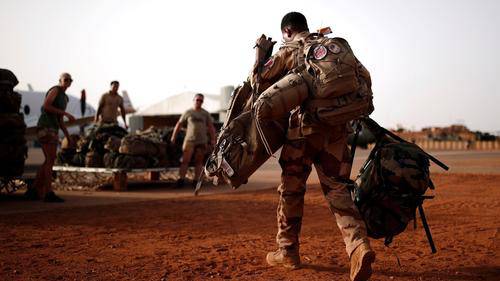
Al Qaeda affiliate open to talks with Mali government if French army forces leave the Sahel
Al Qaeda-affiliated militant groups in the Sahel have indicated a willingness to negotiate with Mali’s government, provided that foreign troops leave the war-torn West African country,
A statement from the group verified on Monday follows a decision by Mali’s President Ibrahim Boubacar Keita last month to consider talks with extremist groups, breaking a long-held government refusal to do so.
Mali has been struggling to quell an extremist insurgency that erupted in the north in 2012 and has since claimed thousands of military and civilian lives.
Despite the presence of French and UN troops in the country, the conflict has also since spread to central Mali as well as neighbouring Burkina Faso and Niger.
In the statement verified by the militant-surveillance NGO Site Intelligence Group, the Al Qaeda-aligned GSIM group said it was ready to discuss ways to end the conflict with the government in Bamako.
But the group said a precondition for talks was “an end to the arrogant, racist, crusader French occupation”.
“There can be no talking about negotiations under the shade of occupation, before the departure of all French forces and their followers from Mali as a whole,” it said.
France has 5,100 soldiers deployed across the Sahel as part of its Barkhane operation. The UN mission in Mali, called Minusma, has 13,000 members.
GSIM described its position as a response to recent protests by Malians against foreign troops in the country.
It said that Bamako should “declare openly an end to the presence of Barkhane and Minusma troops on their territories”.
GSIM, or the Group to Support Islam and Muslims, comprises several different militant groups and has claimed responsibility for numerous attacks on Malian soldiers since its formation in 2017.
Mali’s government has likely talked to militants in secret before to broker ceasefires or retrieve hostages.
In public, Malian leaders have long said they would not negotiate with militants.
But the spiralling unrest in the country pushed Mr Keita to announce a sea change in government policy in February.
“The number of deaths in the Sahel is becoming exponential and it’s time that certain paths be explored,” he said in an interview with French media.
The president had already begun trying to engage before the February interview. A few days prior, one of his envoys said he had been sent to talk to militant leaders such as Amadou Koufa, who heads the Katiba Macina militia, and GSIM leader Iyad Ag Ghali.
At the time of the announcement, Mr Keita said he had not received a response from militant leaders.
He also did not rule out talking to the leader of ISIS in the region, Adnane Abou Walid Al Sahraoui.
That position puts him at odds with the French government, however, which designated ISIS as its greatest enemy in the Sahel at a summit in France in January.
GSIM’s statement began circulating at the weekend. Neither Mali, France nor the UN has yet responded to it.
Source: The National





